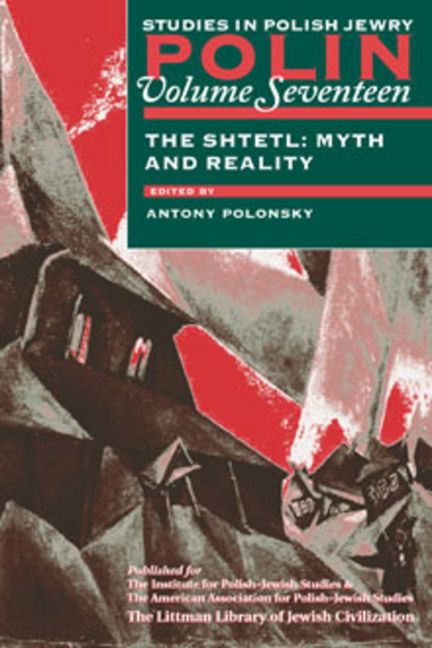Book contents
- Frontmatter
- Dedication
- Editors and Advisers
- Preface
- Polin
- Polin: Studies inPolish Jewry
- Contents
- Note on Place Names
- Note on Transliteration
- List of Abbreviations
- PART I THE SHTETL: MYTH AND REALITY
- PART II NEW VIEWS
- A Jewish Russifier in Despair: Lev Levanda's Polish Question
- Like a Voice Crying in the Wilderness: The Correspondence of Wolf Lewkowicz
- Jewish Prisoner Labour in Warsaw After the Ghetto Uprising, 1943–1944
- The Gęsiówka Story: A Little-Known Page of Jewish Resistance
- PART III DOCUMENTS
- PART IV THE SIXTY-FIFTH ANNIVERSARY OF EVENTS IN PRZYTYK: A DEBATE
- PART V REVIEWS
- OBITUARIES
- Notes on the Contributors
- Glossary
- Index
Like a Voice Crying in the Wilderness: The Correspondence of Wolf Lewkowicz
from PART II - NEW VIEWS
- Frontmatter
- Dedication
- Editors and Advisers
- Preface
- Polin
- Polin: Studies inPolish Jewry
- Contents
- Note on Place Names
- Note on Transliteration
- List of Abbreviations
- PART I THE SHTETL: MYTH AND REALITY
- PART II NEW VIEWS
- A Jewish Russifier in Despair: Lev Levanda's Polish Question
- Like a Voice Crying in the Wilderness: The Correspondence of Wolf Lewkowicz
- Jewish Prisoner Labour in Warsaw After the Ghetto Uprising, 1943–1944
- The Gęsiówka Story: A Little-Known Page of Jewish Resistance
- PART III DOCUMENTS
- PART IV THE SIXTY-FIFTH ANNIVERSARY OF EVENTS IN PRZYTYK: A DEBATE
- PART V REVIEWS
- OBITUARIES
- Notes on the Contributors
- Glossary
- Index
Summary
‘WHO DOESN'T KNOW CAN'T UNDERSTAND’
THE portrait of any nation's history is largely a function of memory. Here I speak not of history understood as a collection of facts connected by a network of apparent interdependencies. Rather, what I have in mind is something that could be called the objective, supra-individual criterion of a person's identity: the secret place in which the peculiar contradictions of human fate commune, where paradoxes shed their illogicality, and variations turn out to be nothing more than different pages from the same book. Out of this memory individuals may draw the sense of their own existence. During dramatic historical moments this memory may become the ultimate point of reference—the Buberian pegs allowing us to erect a tent out in the open field of earthly existence. Unfortunately, this knowledge often comes too late.
Such an idiosyncratic understanding of history is demanded by the reading of an uncommon document that has survived in spite of the logic of history: a collection of letters written between 1922 and 1939 by Wolf Lewkowicz, a Jew from Łódź, to his sister's son Sol Zissman (Shlomo Ya'akov Zissman), living in the United States. Apart from its irrefutable historical value, this correspondence from the inter-war years has special significance. It captures the Jewish community of Łódź from the perspective of an individual; it paints a picture of the life of Łódź Jews as seen through the eyes of someone who, unknowingly, was becoming living history. The drama of a nation read from the perspective of the individual prevents our understanding of the real suffering of concrete people from being dissipated. For this reason it is impossible to treat the letters of Wolf Lewkowicz as just another document on the ignominy of European civilization.
Holocaust historians do not complain of a lack of documents. Rather, the problem is how to animate the memory and imagination of people today, and this purpose appears to be served better by the intimate exchange of words between ordinary people than by impersonal statistics and inventories of facts. We are incapable of truly empathizing with the suffering of millions of people—the tenth or twentieth person becomes an emotional abstraction for us.
- Type
- Chapter
- Information
- The Shtetl: Myth and Reality , pp. 299 - 324Publisher: Liverpool University PressPrint publication year: 2004



